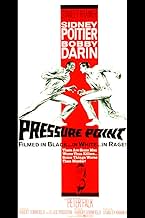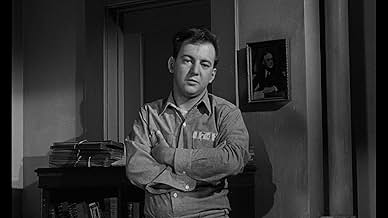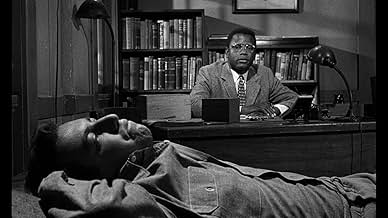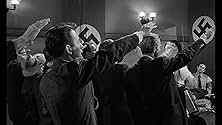Aggiungi una trama nella tua linguaA Black prison psychiatrist is assigned the distasteful task of helping a paranoid American Nazi charged with sedition.A Black prison psychiatrist is assigned the distasteful task of helping a paranoid American Nazi charged with sedition.A Black prison psychiatrist is assigned the distasteful task of helping a paranoid American Nazi charged with sedition.
- Regia
- Sceneggiatura
- Star
- Premi
- 1 candidatura in totale
- Father
- (non citato nei titoli originali)
- Bund Meeting Spectator
- (non citato nei titoli originali)
- Inmate
- (non citato nei titoli originali)
- Bund Meeting Spectator
- (non citato nei titoli originali)
- Patient
- (non citato nei titoli originali)
Recensioni in evidenza
This film is actually flashbacks in a flashback, but it works and is not confusing. It starts with a young psychiatrist (Peter Falk) charging into his boss' office (Sidney Poitier) and saying he cannot successfully treat the patient he has because the patient is black and hates him because he is white. Poitier responds by telling him that he really knows how he feels and tells the tale of how, in 1942, as a young psychiatrist, he treated an American Nazi (Bobby Darin) in a prison hospital who looked down on him because he was black.
Bobby Darin's character has been unable to sleep and has been passing out. The doctor probes into his past and finds the usual tropes of the abusive drunken dad and enabling mother who deals with the situation by becoming a hypochondriac. Darin's character grows up to be an abusive violent person himself, ultimately finding himself in the American Nazi party. Poitier's character correctly mentions that millions of people must have come from situations as bad as his patient, but have managed to conduct themselves without violent actions or delusions. I would mention the actual names of the characters, but the film simply calls the characters - Doctor, Patient, Jewish Girl, etc.
I won't say much more because I don't want to give away anything. This works because of the great dialogue and performances. Bobby Darin didn't make very many movies because of his short life, but this is a great chilling performance. Sidney Poitier gave many great performances in his long career, so I think this one is probably under appreciated because of that. Let me also mention the person who plays Darin's character as a child - Barry Gordon. He let's the viewer feel the loneliness and powerlessness of the character as a child, leading him to have a total lack of empathy as an adult.
In 1942, the doctor is assigned to give psychiatric treatment and evaluate a dangerous American Nazi patient (Bobby Darin) accused of sedition. The racist patient has nightmares and insomnia and the doctor analyzes him along eighteen months, finding the reason of his disturbance. The patient convinces the board of direction that he deserves to be on probation but the doctor is reluctant and diagnoses that the patient has only resolved his sleeping problem but is still a despicable bigoted person.
"Pressure Point" is a theatrical film of intolerance and stress, dated in 2012, but nevertheless a great movie. I do not know how accurate is the psychiatric treatment, but the duel between Bobby Darin and Sidney Poitier is outstanding, both performing victims with strong characters – the patient, son of an abusive father that made him a bigot sadist and the doctor, a winner in a racist society. My vote is seven.
Title (Brazil): "Tormentos da Alma" ("Torments of the Soul")
Twenty years back from the Civil Rights era, at its height when Pressure Point was made, back to World War II Poitier is a prison psychiatrist who gets one bad patient. It's Bobby Darin who had never been seen like this on film, as a racist punk who belongs to the German American Bund. Although Darin and his band of thugs have done some really violent crimes, some of which we see in flashback, it's for sedition that he's been arrested.
Still a recurring nightmare brings him to the couch in Poitier's office and the two of them develop a curious relationship. Darin pushes all of Poitier's buttons, in fact he's a pretty loathsome type. Curing his nightmares will not necessarily make him one that will socially adjust back in society.
Film Historians have called Poitier things like Saint Sidney for the heroic good roles he played back in the day as the first black leading man in mainstream films. He might just have qualified for it here, even more than in his film debut No Way Out dealing with another racist criminal Richard Widmark, that time as a medical doctor.
It was Darin who showed the acting chops here that were never displayed before. He was nominated for his performance as a Best Supporting Actor in Captain Newman, MD., personally I think this is his best screen work.
Pressure Point is a two person work, the rest of the cast merely serves as background figures. I'm wondering though why someone like Peter Falk consented to a role that's confined to two scenes at the beginning and the end with no real opportunity for him to display his talents. Still for fans of Poitier or Darin or both this is a chance to see them both at their best.
Lo sapevi?
- QuizProducer Stanley Kramer directed the framing story, which refers to the present-day story that Sidney Poitier tells to Peter Falk.
- BlooperThe calendar visible on the wall of the Doctor's office in 1942 is not correct for that year. (It would be correct for 1962.)
- Citazioni
Doctor: [angrily to the Patient] This is my country! This is where I've done what I've done, and if there were a million cruds like you, all sick like you are sick, all shouting, 'Down, destroy, degrade,' and if there were 20 million more sick enough to listen to them, you are still gonna lose! You're gonna lose, Mister, because there is something in this country, something so big, so strong that you don't even know... something big enough to take it from people like you and come back and nail you into the ground. You're walking out of here? You are going nowhere! Now get out!
- Colonne sonoreHere Comes the Bride
("The Bridal Chorus") (uncredited)
Composed by Richard Wagner (1850)
Sung at bund meeting
I più visti
- How long is Pressure Point?Powered by Alexa
Dettagli
Botteghino
- Budget
- 1.000.000 USD (previsto)
- Tempo di esecuzione1 ora 31 minuti
- Colore
- Mix di suoni
- Proporzioni
- 1.85 : 1
































